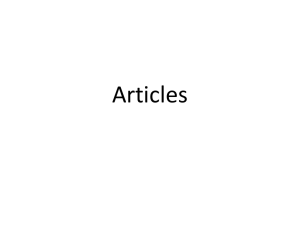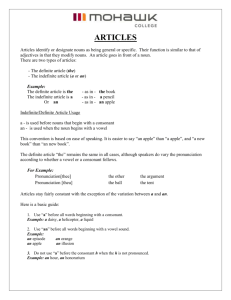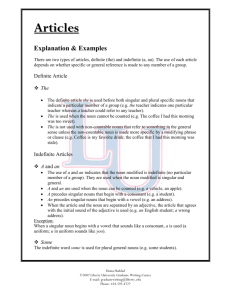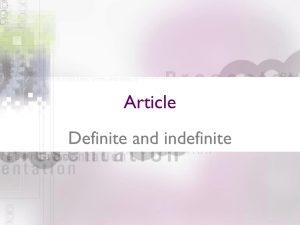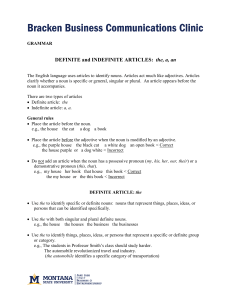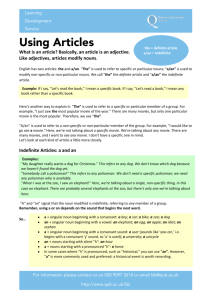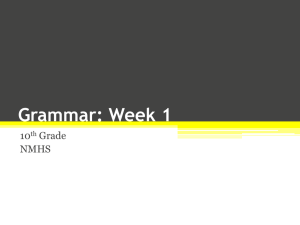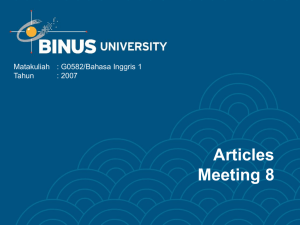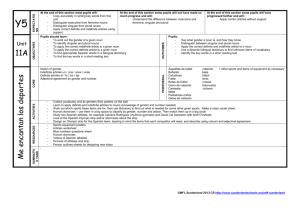Articles: a/an/the
advertisement
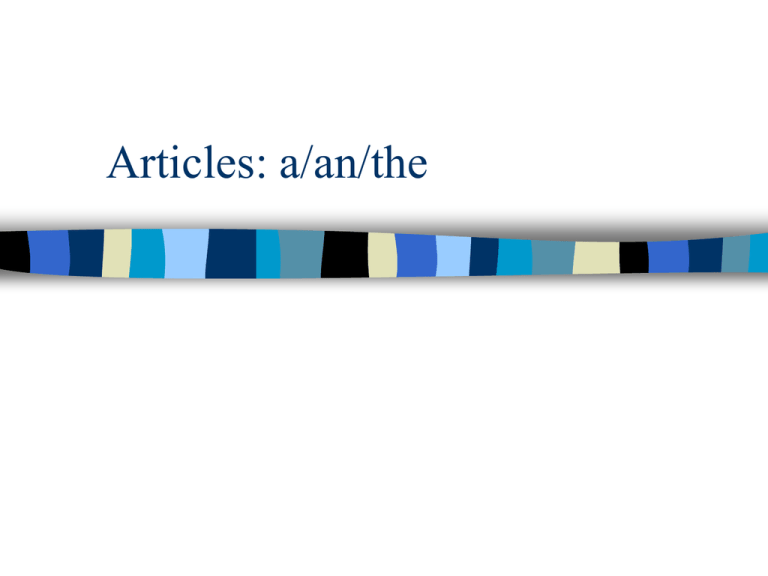
Articles: a/an/the Using Articles • What is an article? Basically, an article is an adjective. Like adjectives, articles modify nouns. • English has two articles: the and a/an. The is used to refer to specific or particular nouns; a/an is used to modify non-specific or non-particular nouns. We call the the definite article and a/an the indefinite article. • the = definite article • a/an = indefinite article • For example, if I say, "Let's read the book," I mean a specific book. If I say, "Let's read a book," I mean any book rather than a specific book. • Here's another way to explain it: The is used to refer to a specific or particular member of a group. • "I just saw the most popular movie of the year.“ • (There are many movies, but only one particular movie is the most popular. Therefore, we use the.) •"A/an" is used to refer to a non-specific or nonparticular member of the group. "I would like to go see a movie." Here, we're not talking about a specific movie. We're talking about any movie. There are many movies, and I want to see any movie. I don't have a specific one in mind. •Normally, we use a/an to refer to something for the first time. “We went to a museum in Paris.” Remember, using a or an depends on the sound that begins the next word. So... • a + singular noun beginning with a consonant: a boy; a car; a bike; a zoo; a dog • an + singular noun beginning with a vowel: an elephant; an egg; an apple; an idiot; an orphan • a + singular noun beginning with a consonant sound: a user ( consonant 'y' sound, so 'a' is used); a university; a uniform • If the noun is modified by an adjective, the choice between a and an depends on the initial sound of the adjective that immediately follows the article: • a broken egg • an unusual problem • a European country (consonant /j/ sound) • Remember, too, that in English, the indefinite articles are used to indicate membership in a group: • I am a teacher. (I am a member of a large group known as teachers.) • Brian is an Irishman. (Brian is a member of the people known as Irish.) Definite Article: the • The definite article is used before singular and plural nouns when the noun is specific or particular. The signals that the noun is definite, that it refers to a particular member of a group. For example: • "The dog that bit me ran away." Here, we're talking about a specific dog, the dog that bit me. • "I was happy to see the policeman who saved my cat!“ Here, we're talking about a particular policeman. Even if we don't know the policeman's name, it's still a particular policeman because it is the one who saved the cat. Geographical use of the Do not use the before: • names of most countries/territories: Italy, Mexico, Bolivia; however, the Netherlands, the Dominican Republic, the Philippines, the United States, the United Kigdom. • • names of cities, towns, or states: Seoul, Manitoba, Miami names of streets: Washington Blvd., Main St. • names of lakes and bays: Lake Titicaca, Lake Erie except with a group of lakes like the Great Lakes • names of mountains: Mount Everest, Mount Fuji except with ranges of mountains like the Andes • names of continents (Asia, Europe) • names of islands Do use the before: • names of rivers, oceans and seas: the Nile, the Pacific • points on the globe: the Equator, the North Pole • geographical areas: the Middle East, the West • deserts, forests, gulfs, and peninsulas: the Sahara, the Persian Gulf, the Black Forest, the Iberian Peninsula Don’t forget the: • The center, the top, the middle, the bottom, the left, the right, the end of, the beginning of… • The same, the best, the worst… • The sun, the moon, the world, the sky, the sea, the ground, the country… • The police, the fire brigade, the army… • The piano, the guitar, the trumpet, the flute… • The radio (but television, without the) • The doctor, the toilet, the bank, the theater, the post office, the dentist, the cinema… Do not use the: • Breakfast, lunch, dinner • Go to work, get to work, be at work, start work, finish work… • Got to school, be at school, start school, leave school… • Go to university, be at university… • Go to church, be in church • Go to bed, be in bed • Go to hospital, be in hospital • Go to prison, be in prison • Go home, get home, arrive home, come home, walk home, leave home, be at home, stay at home Omission of Articles Some common types of nouns that don't take an article are: • Names of languages and nationalities: Chinese, English, Spanish, Russian • Names of sports: volleyball, hockey, baseball • Names of academic subjects: mathematics, biology, history, computer science
